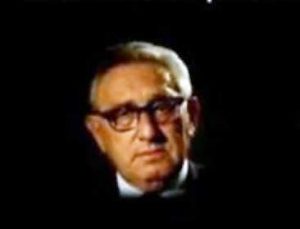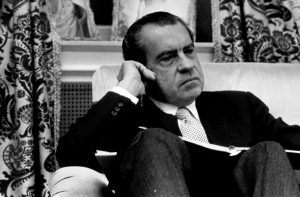Do not confuse covert action with missionary work.
∼ Henry Kissinger
If you look into Richard Nixon’s role in the Vietnam War, you will also uncover a lot of information on the dour-faced Henry Kissinger who was Nixon’s confidant and trusted assistant regarding management of the war in Southeast Asia.

Because of Kissinger’s stern face and grim demeaner, one may get the impression that he was inflexible and rigid in thought and policy, however that is not the case at all. Many people thought the gravelly voiced Kissinger was a hawk regarding the Vietnam War, but in fact by 1968 he felt the war was lost and wanted to get out. He had little faith in the South Vietnamese government and their ability to assume responsibility for the war. His reluctant support of the conflict was based on his feeling that the U.S. would look bad if the South Vietnamese government and military failed. He initially opposed the incursion into Cambodia in 1970 and only became a proponent under intense pressure from President Nixon.
In 1971, despite resistance from South Vietnamese President Thieu, Kissinger secretly met with North Vietnamese diplomat Le Duc Tho in Paris to discuss cease fire negotiations. In 1972 Kissinger and Tho met again in Paris and worked up an agreement to end the war. Nixon was initially supportive of the agreement, however after being pressured by aids Haldeman and Erlichman, he requested significant changes to the pact, which Tho summarily rejected. And although Kissinger expressed outrage at the communists for walking out of the talks, it was Nixon’s 69 amendments that doomed the agreement.
In 1972 Kissinger’s true feelings about the war were revealed during an off-script interview with Italian journalist Oriana Fallaci, with whom he had an infatuation. During the interview Kissinger shot himself in the foot, stating that Vietnam was a useless war and that he would prefer to have dinner with communist diplomat Le Duc Tho, rather than South Vietnamese president Ngyuen Van Thieu. Kissinger also alluded to the Nixon presidency as one dominated by “cowboy management” after which he incurred the wrath of an enraged Richard Nixon when the interview was published.

In 1973, with Nixon up to his neck in the Watergate scandal, Kissinger and Tho went back to the table, and agreed to the document as written prior to Nixon’s meddling. As per the agreement, apart from a small security force, American military units left Vietnam by the end of that year.
In 1974 Kissinger reversed course again, this time regarding negotiations with the Soviet Union and China on their role in the war, which he had previously ignored. The two benefactors of North Vietnam agreed to end shipments of military hardware during the talks. At the same time Kissinger also urged the U.S. congress to provide an additional $700 million in aid to South Vietnam. Congress refused to send the full amount requested, although they did pony up $400 million more for the beleaguered nation. Kissinger clung to the belief that the $300 million dollar difference would have saved Saigon, a position that few others shared.

Cambodia with a troubled history, is at peace today.
In 1975 Kissinger informed the murderous Khmer Rouge regime that the U.S. and Cambodia could still remain friends. He justified this position with the belief that Pol Pot provided a counterweight to the now (totally) communist Vietnam. Gerald Ford was now president, and unlike the meteoric Nixon, Ford kept his anger in check, for the most part. Ford admired and respected Kissinger, and we have no record of his thoughts regarding Kissinger’s remarks.
In a 1975 meeting with Indonesia, Ford, accompanied by Kissinger, displayed a remarkable casualness regarding the activities of the genocidal Khmer Rouge, though some attributed his casualness to naivety. Kissinger later reported that he was surprised, but not alarmed by Ford’s demeaner, ignoring his own remarks to the Khmer officials.
Other Roles
Kissinger was active in many other international conflicts during the Vietnam War. He wore many hats and eventually became Nixon’s secretary of state, a position which he held into the Ford administration, though in a lesser capacity after being muscled aside by Brent Scowcroft.
Kissinger left office when Jimmy Carter defeated President Ford in the 1976 election. But he was a board member of many institutions of higher knowledge and authority after he left office and was consulted by presidential administrations regarding international issues up until just a few years before his passing at the age of one hundred in 2023.
It’s not a matter of what is true that counts, but a matter of what is perceived to be true. ∼ Henry Kissinger
You may share this blog in its entirety, crediting Joe as the author. Copyright protected, all rights reserved © Joe Campolo Jr.
Updated: May 21, 2024 at 7:58 am
About the Author
Joe Campolo Jr.
Joe Campolo, Jr. is an award winning author, poet and public speaker. A Vietnam War Veteran, Joe writes and speaks about the war and many other topics. See the "Author Page" of this website for more information on Joe.
Guest writers on Joe's blogs will have a short bio with each article. Select blogs by category and enjoy the many other articles available here.
Joe's popular books are available thru Amazon, this website, and many other on-line book stores.


